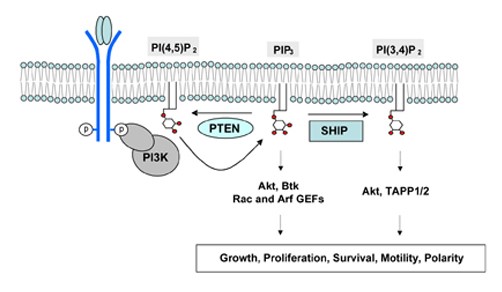Based on the comprehensive memebrane protein production platform established through years of experience, our scientists from Creative Biostructure can provide advanced custom Mempro™ phosphatidylinositol 3-/4-kinase production services using plant-based expression system.
Phosphatidylinositol 3-kinase (PI3-kinase) is an enzyme that can phosphorylate phosphoinositides on the 3-hydroxyl group of the inositol ring and function as secondary messengers in cell signaling. Phosphatidylinositol 4-kinase (PI4-kinase) is an enzyme that can act on PI in the first committed step in the production of the secondary messenger inositol-1'4'5'-trisphosphate. These enzymes form as the dimer, consisting of a catalytic and a regulatory subunit. Activation of PI-kinases are involved in the regulation of various cellular functions in both animals and higher plants, such as control of cell growth, regulation of cell cycle progression, a DNA damage checkpoint, recombination, and maintenance of telomere length. PI 3-/4-kinases share a conserved catalytic domain at their C-terminal section.

Figure 1. The biological function of PI3K. (The Inositol Lipid Signalling Laboratary)
Mempro™ plant-based expression system holds a lot of advantages, including 1) low endotoxin, 2) low protease activity and 3) animal-free. In general, animal-free recombinant membrane proteins are particularly important for customers concerned with experimental variables caused by trace animal components or mammalian pathogens. Our proprietary Mempro™ plant-based membrane protein platform is free of animal components, serum, endotoxins and antibiotics as well as human or animal infectious agents or other endogenous mammalian contamination.
Creative Biostructure can provide membrane protein production services using various types of plants, such as Nicotiana benthamiana (tobacco), Medicago rativa (alfalfa), Arabidopsis thaliana (A. thaliana), potato, maize, barley and lettuce. Moreover, we are capable of performing two different strategies for membrane protein expression in plants: transient expression and stable transformation.
With the Mempro™ plant-based protein production platform, Creative Biostructure can express, isolate, purify and crystallize phosphatidylinositol 3-/4- kinases to facilitate the study of their structural and biological functions. Misfolding, aggregation, inactivity, poor stability, high endotoxin and solubility, etc. are the common difficulties encountered in cell-based expression system. These difficulties can be overcomed in the renewed plant-based expression system.
Creative Biostructure can also provide Mempro™ plant-based virus-like particles (VLPs) production services, Mempro™ animal-free recombinant protein production services and Mempro™ membrane protein production services. Please feel free to contact us for a detailed quote.
References:
A. Wiktorek-Smagur, et al. (2012). Green way of biomedicine – how to force plants to produce new important proteins. Transgenic Plants-Advances and Limitations, Chapter 3. doi: 10.5772/1409.
F. Junge, et al. (2008) Large-scale production of functional membrane proteins. Cellular Mol. Life Sci., 65 (11): 1729-1755.
J. Y. Jung, et al. (2002). Phosphatidylinositol 3- and 4-phosphate are required for normal stomatal movements. Plant Cell., 14(10): 2399-2412.
M. Fujimoto, et al. (2015). Phosphatidylinositol 3-kinase and 4-kinase have distinct roles in intracellular trafficking of cellulose synthase complexes in Arabidopsis thaliana. Plant Cell Physiol., 56(2): 287-298.
